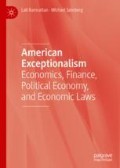Abstract
The publication of Alexis de Tocqueville’s Democracy in America kindled interest in many nations and disciplines to appraise the exceptional nature of their activities. None of the prior published works, however, have focused their analysis from the economic point of view. Some of the available books include Max Lerner (1987), Seymour Martin Lipset (1996), Deborah Madsen (1998), Newt Gingrich (2011), Oliver Stone and Peter Kuznich (2013), and Dick Cheney and Liz Cheney (2015).
Perhaps a major reason economics has been neglected from this discussion in the past is because economics was long considered a “dismal science” following Thomas Carlyle’s characterization of the Malthus demographic model. Over time, however, thinking has evolved and increasingly for more practitioners, economics has become the “queen of the social sciences.” This book fills a gap in the literature concerning American Exceptionalism by furthering the debates and highlighting the pros and cons of American Exceptionalism, from the economic, financial, political economic, and legal economic perspectives.
For the disciplines selected, the study is hierarchical in the sense that top names of people in the field and scientific topics of the disciplines are only touched on. For instance, landmark empirical achievements in the areas of Cobb-Douglas production function, the rational expectation and efficient market hypotheses, and computational general equilibrium analysis were not directly engaged. Similarly, big names such as Frank Tausig’s applied trade theory and Gary Becker’s socio-economic analysis are untouched. Also, we avoided empirical application relating to economic crises such as the Great Depression (1930), Great Recession (2008), the Pesos, Asian, and other crises. These works are important in that they are underscored by human blunder and scientific revolution, but they are often unsettled in regard to their causes.
A purview of what we have discussed is given here, chapter by chapter. Chapter 2 considers both qualitative and quantitative theories. Budding theories that became the high theories of economics and finance are investigated in Chaps. 3 and 4. When President John Adams was confronted with the French Comptroller-General of Finances M. Turgot’s criticisms of the American government, President Adams resorted to a historic survey of types of government, from ancient Greece to the Middle Ages. Similarly, we have included a final discussion in Chap. 5 to present the argument for American Exceptionalism in the domain of political economy and economic law over the ages.
Access this chapter
Tax calculation will be finalised at checkout
Purchases are for personal use only
Bibliography
Ceaser, J.W. 2012. The Origins and Character of American Exceptionalism. American Political Thought: A Journal of Ideas, Institution, and Culture 1: 6–7.
Cheney, D., and L. Cheney. 2015. Exceptionalism: Why the World Needs a Powerful America. New York: Threshold Editions.
Dahl, Robert A., Ian Shapiro, and Jose Antonio Cheibub. 2003. The Democracy Source Book. Cambridge, MA: MIT Press.
Gingrich, N. 2011. A Nation Like No Other: Why American Exceptionalism Matters. Washington, DC: Regnery Publishing.
Lerner, Max. 1987. America as a Civilization. New York: Henry Holt.
Lipset, Seymour Martin. 1996. American Exceptionalism: A Double-Edged Sword. New York: W.W. Norton.
Lipset, S.M. 2000. Still the Exceptional Nation? The Wilson Quarterly 24 (1): 31–45.
Lucas, J. 2005. Democracy and Populism: Fear and Hatred. New Haven: Yale University Press.
Madsen, Deborah L. 1998. American Exceptionalism. Jackson: University Press of Mississippi.
Myrdal, G. 1962. An American Dilemma. New York: Harper and Row.
Samuelson, P.A. 1977. The Collected Scientific Papers of Paul A. Samuelson, ed. Hiroaki Nagatani and Kate Crowley, vol. 4. Cambridge: MIT Press.
Schleifer, J.T. 2012. The Chicago Companion to Tocqueville’s Democracy in America. Chicago: University of Chicago Press.
Stone, O., and P. Kuznick. 2013. The Untold History of the United States. New York: Gallery Books.
Tiryakian, E.A. 1993. American Religious Exceptionalism: A Reconsideration. Annals of the American Academy of Political and Social Science 527 (May): 40–54.
Tocqueville, A.D. 1963 [1835]. Democracy in America, vol. 1–2. New York: Alfred A. Konpf.
Author information
Authors and Affiliations
Rights and permissions
Copyright information
© 2019 The Author(s)
About this chapter
Cite this chapter
Ramrattan, L., Szenberg, M. (2019). Introduction. In: American Exceptionalism. Palgrave Macmillan, Cham. https://doi.org/10.1007/978-3-030-05557-8_1
Download citation
DOI: https://doi.org/10.1007/978-3-030-05557-8_1
Published:
Publisher Name: Palgrave Macmillan, Cham
Print ISBN: 978-3-030-05556-1
Online ISBN: 978-3-030-05557-8
eBook Packages: Economics and FinanceEconomics and Finance (R0)

